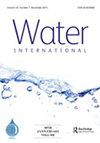Editors’ introduction
IF 1.5
4区 环境科学与生态学
Q3 ENGINEERING, CIVIL
引用次数: 0
Abstract
Smart water management refers to the use of advanced information and communications technologies (ICTs) to improve water management and provision of services, including supply, treatment, conservation and disaster control. These technologies have the potential to increase efficiency and effectiveness in water provision, while reducing energy consumption, and facilitating the management of water-related risks and disasters. Smart water management can also help to improve water quality by providing real-time monitoring and control of water pollution levels, allowing prompt and effective responses to protect public health and the environment. (Nickum et al., 2020). Smart water technologies are developing rapidly in many parts of the world, providing an evolving set of innovative tools and solutions. The use of ICTs is frequently presented as a powerful strategy for ‘smart’ development, that is, economic development that encompasses and environmental sustainability (Office of Sustainable Communities, US Environmental Protection Agency (EPA) 2016; European Investment Bank, 2017). In a context of urbanization and climate change, the need to find innovative solutions that can help to address these challenges has become increasingly important. The integration of cutting-edge technologies and data analytics promises to provide ways to enhance water governance by addressing the challenges facing the sector. Smart technologies, such as sensor networks, superfast cloud and edge computing, digitalization of infrastructures and control systems, etc., are permeating much of our daily lives worldwide and affect our usage and relationship with water management. Many developed countries have embraced the digitalization of the water sector as a strategy to optimize the use of water resources, reduce waste and improve water quality. Germany’s ‘Water 4.0’ initiative, the United States’ ‘Digitizing Utilities’ programme, Israel with its ‘Digital Israel’ strategy or Singapore with its ‘Smart Nation’ approach, amongst others, have put at the centre of their national strategies the need to improve the efficiency and effectiveness of water management, from water collection to decision-making. The private sector is also supporting these efforts to modernize infrastructure by leveraging digital technologies. Initiatives such as ‘Digital Water Platform’ by MWH/Stantec, ‘Industry 4.0 Water’ by Deloitte or ‘Smart Water Solutions’ by Siemens seek to increase the take-up by water utilities and others of digital technologies such as the Internet of Things (IoT), artificial intelligence (AI) and data analytics (Leflaive et al., 2020). Moreover, many countries and organizations have developed approaches to facilitate investment and technological exchange through overseas development assistance (ODA) (Yangyang Li et al., 2023) In China, smart water management has become a critical issue. China’s growing urban population and rapid economic development has made increasing demands for water resources to support agricultural, industrial and domestic needs. At the same time, WATER INTERNATIONAL 2023, VOL. 48, NO. 3, 305–308 https://doi.org/10.1080/02508060.2023.2204627编辑简介
智能水资源管理是指利用先进的信息和通信技术来改善水资源管理和提供服务,包括供应、处理、保护和灾害控制。这些技术有可能提高供水的效率和效力,同时减少能源消耗,并促进与水有关的风险和灾害的管理。智能水管理还可以通过实时监测和控制水污染水平来帮助改善水质,从而做出及时有效的反应,保护公众健康和环境。(Nickum等人,2020)。智能水务技术在世界许多地方发展迅速,提供了一套不断发展的创新工具和解决方案。信息和通信技术的使用经常被认为是“智能”发展的有力战略,即包括环境可持续性的经济发展(可持续社区办公室,美国环境保护局(EPA)2016;欧洲投资银行,2017)。在城市化和气候变化的背景下,寻找有助于应对这些挑战的创新解决方案的必要性变得越来越重要。尖端技术和数据分析的集成有望通过应对该行业面临的挑战,提供加强水治理的方法。智能技术,如传感器网络、超高速云和边缘计算、基础设施和控制系统的数字化等,正在渗透到我们全球的大部分日常生活中,并影响我们的使用和与水管理的关系。许多发达国家已将水务部门数字化作为优化水资源利用、减少浪费和改善水质的战略。德国的“水4.0”倡议、美国的“数字化公用事业”计划、以色列的“数字以色列”战略或新加坡的“智慧国家”方法等,都将提高水管理效率和有效性的必要性置于国家战略的中心,从水收集到决策。私营部门也在支持这些利用数字技术实现基础设施现代化的努力。MWH/Stantec的“数字水务平台”、德勤的“工业4.0水务”或西门子的“智能水务解决方案”等举措旨在提高水务公司和其他数字技术的使用率,如物联网(IoT)、人工智能(AI)和数据分析(Leflaive等人,2020)。此外,许多国家和组织已经制定了通过海外发展援助促进投资和技术交流的方法(Yangyang Li et al.,2023)在中国,智能水管理已经成为一个关键问题。中国不断增长的城市人口和快速的经济发展,对水资源的需求不断增加,以满足农业、工业和国内需求。同时,WATER INTERNATIONAL 2023,第48卷,编号305-308https://doi.org/10.1080/02508060.2023.2204627
本文章由计算机程序翻译,如有差异,请以英文原文为准。
求助全文
约1分钟内获得全文
求助全文
来源期刊

Water International
工程技术-工程:土木
CiteScore
4.40
自引率
7.70%
发文量
58
审稿时长
6-12 weeks
期刊介绍:
Water International is the official journal of the International Water Resources Association (IWRA), founded in 1972 to serve as an international gateway to the people, ideas and networks that are critical to the sustainable management of water resources around the world. Water International''s articles, state-of-the-art reviews, technical notes and other matter are policy-relevant and aimed at communicating in-depth knowledge to a multidisciplinary and international community. Water International publishes both individual contributions and thematic special issues and sections on cutting edge issues.
All individual manuscript submissions are subject to initial appraisal and peer review by the Deputy Editor in Chief and the Associate Editors, and, if found suitable for further consideration, to peer review by at least one independent, anonymous expert referee. All external peer review is double blind. Thematic issues and sections are handled under comparable procedures by guest editors under the oversight of the Editor in Chief.
 求助内容:
求助内容: 应助结果提醒方式:
应助结果提醒方式:


